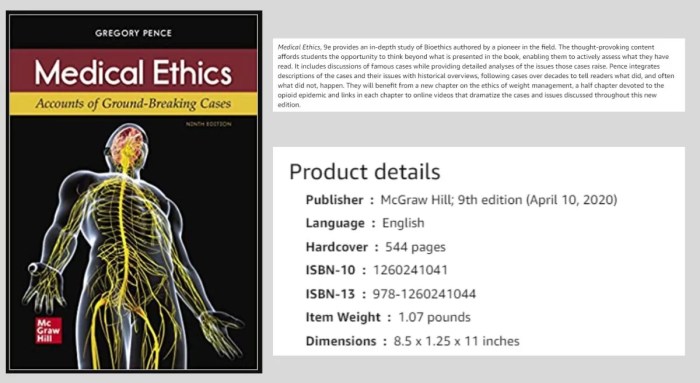Law and ethics for health professions 9th edition pdf free – Embark on a journey into the intricate realm of law and ethics in healthcare with the highly acclaimed “Law and Ethics for Health Professions, 9th Edition.” This comprehensive guide unveils the legal obligations and ethical principles that shape the decision-making processes of healthcare professionals, ensuring the delivery of compassionate and responsible care.
Delving into the complexities of patient care, the text explores the impact of legal and ethical considerations on end-of-life decisions, medical errors, and treatment refusals. It emphasizes the significance of legal and ethical guidelines in safeguarding patient rights and fostering a culture of patient safety.
Legal Responsibilities and Ethical Considerations
Health professionals have various legal obligations and ethical principles that guide their practice. These include confidentiality, informed consent, and negligence, as well as beneficence, non-maleficence, autonomy, and justice.
Legal Obligations
- Confidentiality: Protecting patient information from unauthorized disclosure.
- Informed Consent: Obtaining patient’s consent after providing adequate information about the procedure, risks, and benefits.
- Negligence: Failing to provide a reasonable standard of care, resulting in patient harm.
Ethical Principles
- Beneficence: Acting in the best interests of the patient.
- Non-maleficence: Avoiding harm to the patient.
- Autonomy: Respecting the patient’s right to make decisions about their own care.
- Justice: Ensuring fair and equitable distribution of healthcare resources.
Law and Patient Care

Legal and ethical considerations impact patient care decisions in various ways:
End-of-Life Care
- Determining appropriate treatment for terminally ill patients.
- Respecting patient autonomy and wishes.
- Balancing patient’s right to die with society’s interest in preserving life.
Medical Errors
- Preventing and responding to medical errors.
- Legal liability for negligence.
- Importance of open communication and patient safety initiatives.
Treatment Refusals
- Patient’s right to refuse treatment.
- Healthcare provider’s obligation to respect patient’s autonomy.
- Exceptions for emergency situations or risk to others.
Healthcare Regulations and Compliance
Health professionals must adhere to various healthcare regulations, including:
HIPAA, Law and ethics for health professions 9th edition pdf free
- Protecting patient health information privacy.
- Ensuring patient consent for information sharing.
- Consequences of non-compliance.
OSHA
- Ensuring workplace safety for healthcare workers.
- Preventing exposure to hazardous substances and infections.
- Providing proper safety equipment and training.
EMTALA
- Requiring hospitals to provide emergency medical care regardless of ability to pay.
- Prohibiting patient dumping.
- Importance of maintaining ethical practices in emergency situations.
Ethical Challenges in Healthcare
Health professionals face ethical dilemmas, such as:
Conflicts of Interest
- Balancing personal interests with patient care.
- Disclosing potential conflicts of interest.
- Avoiding financial incentives that may influence patient decisions.
Resource Allocation
- Making decisions about scarce healthcare resources.
- Ensuring fair distribution of resources.
- Prioritizing patients based on medical need and urgency.
End-of-Life Decisions
- Determining appropriate end-of-life care.
- Respecting patient autonomy while considering family wishes.
- Providing compassionate and dignified care for dying patients.
Legal and Ethical Decision-Making

Healthcare professionals must make legal and ethical decisions by:
Considering Legal Implications
- Understanding relevant laws and regulations.
- Consulting with legal counsel when necessary.
- Balancing legal obligations with ethical principles.
Considering Ethical Implications
- Applying ethical frameworks to decision-making.
- Seeking guidance from ethics committees.
- Prioritizing patient well-being and autonomy.
Documenting Decisions
- Recording patient consent and treatment plans.
- Justifying decisions in patient records.
- Ensuring transparency and accountability.
Professionalism and Ethics in Healthcare

Professionalism involves:
Maintaining Competence
- Staying up-to-date on medical knowledge and skills.
- Seeking continuing education and training.
- Demonstrating proficiency in patient care.
Engaging in Lifelong Learning
- Continuously expanding knowledge and skills.
- Attending conferences and workshops.
- Participating in research and innovation.
Promoting Patient Well-being
- Providing compassionate and respectful care.
- Advocating for patient rights.
- Maintaining patient confidentiality and privacy.
Case Studies and Ethical Analysis
Case studies help illustrate ethical challenges and decision-making processes:
Case 1: Jehovah’s Witness Refusing Blood Transfusion
- Ethical dilemma: Balancing patient autonomy with potential harm.
- Legal implications: Informed consent and patient rights.
- Ethical analysis: Applying ethical principles of autonomy, non-maleficence, and beneficence.
Case 2: Allocation of Scarce Organ
- Ethical dilemma: Determining fair and equitable distribution of resources.
- Legal implications: EMTALA and patient rights.
- Ethical analysis: Considering ethical principles of justice, utility, and beneficence.
Future Trends in Law and Ethics in Healthcare
Emerging trends include:
Artificial Intelligence
- Ethical concerns about privacy, bias, and accountability.
- Legal implications for data collection and usage.
- Importance of developing ethical guidelines for AI in healthcare.
Genetic Technologies
- Ethical dilemmas related to genetic testing, screening, and editing.
- Legal considerations for genetic information privacy and discrimination.
- Need for ongoing ethical and legal discussions about the responsible use of genetic technologies.
FAQ Compilation: Law And Ethics For Health Professions 9th Edition Pdf Free
What are the key ethical principles that guide health professionals?
Beneficence, non-maleficence, autonomy, and justice are the fundamental ethical principles that guide healthcare professionals in their decision-making.
How do legal and ethical considerations impact patient care decisions?
Legal and ethical considerations significantly influence patient care decisions, including end-of-life care, medical errors, and treatment refusals. These considerations help ensure that patient rights are respected and that care is provided in a responsible and ethical manner.
What are the consequences of non-compliance with healthcare regulations?
Non-compliance with healthcare regulations can result in fines, penalties, and even criminal charges. It can also damage the reputation of healthcare providers and erode public trust in the healthcare system.
How can health professionals resolve ethical challenges in a way that aligns with legal and ethical principles?
Health professionals can resolve ethical challenges by considering the legal, ethical, and practical implications of their decisions, seeking guidance from ethical frameworks and legal principles, and engaging in collaborative decision-making with patients and colleagues.